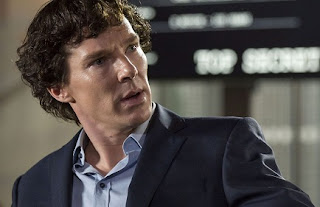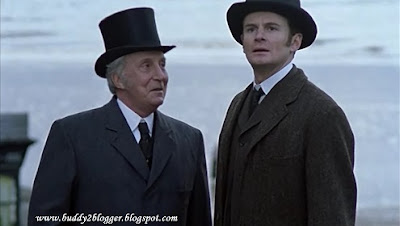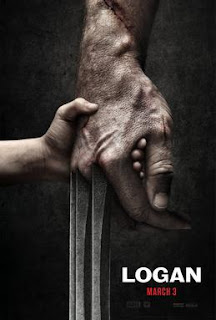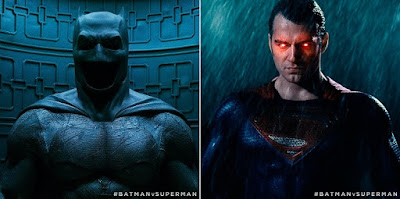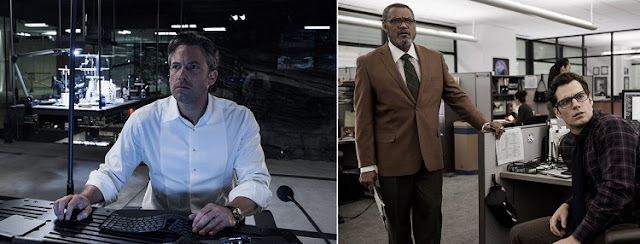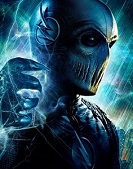The first episode of Season 4 has aired and as can be expected, Mark Gatiss has scripted quite a few nods to Arthur Conan Doyle's original stories and novels. There might be spoilers and the readers who are yet to watch the episode are recommended to skip this post.
1. Sherlock takes a case from a pile affixed to the mantelpiece with a knife - Dr John Watson writes about Sherlock Holmes in The Adventure of the Musgrave Ritual: “..his unanswered correspondence transfixed by a jack-knife into the very centre of his wooden mantelpiece,…”
2. An onscreen text reads: “Mr Hatherley came straight round to Baker Street in a terrible state. He was white as a sheet and bleeding from an awful wound on his hand. Exactly how he came by this wound was at first confusing...”. Sherlock then says: “Come back, it is the wrong thumb” - Reference to the Canonical story, The Adventure of the Engineer's Thumb in which Victor Hatherley, the titular hydraulic engineer has his thumb severed by Colonel Lysander Stark.
3. There is a case involving a jellyfish being the assassin - Reference to the Canonical story, The Lion's Mane. In this story, the murderer is Lion's Mane Jellyfish (Cyanea capillata).
4. Sherlock sends a text: “Fresh paint to disguise another smell” - In The Adventure of the Retired Colorman, Holmes explains how he deduced that Josiah Amberley is the killer: “Why should this man at such a time be filling his house with strong odours? Obviously, to cover some other smell which he wished to conceal - some guilty smell which would suggest suspicions.”
5. Sherlock texts: “If dog can't swim, neighbour is the killer” - This is a bit tenuous, but reminded me of the“singular epidemic among the sheep” in The Silver Blaze. In this story, Sherlock Holmes guesses that the killer (John Straker) would have practiced nicking the tendons on the sheep before trying it out on the titular horse. Further, after Silver Blaze escaped after accidentally killing Straker, it was taken care of by one of the neighbors (Silas Brown).
Click on the link below to order your copy of Season 4:
6. DI Hopkins (Eleanor Matsuura) mentions to DI Lestrade about the case of the Borgia Pearl - This is a reference to The Adventure of the Six Napoleons, the story that inspired the title of this episode. The plot of that story involves an Italian immigrant (Beppo) who hides the black pearl of the Borgias inside a bust of Napoleon Bonaparte.
7. Sherlock is seen lecturing the baby Rosamund Mary: “As always you see, but you do not observe” - Sherlock Holmes tells Dr John Watson in A Scandal in Bohemia: “You see, but you do not observe. The distinction is clear.”
8. Sherlock's deduces that his client started out in manual labor by observing that his right hand is bigger than his left. Then the client confirms that he was a carpenter. When Sherlock explains how he came to his conclusions, the client downplays the detective's skills as being simple and that that there is not much to them - In The Red-Headed League, Sherlock explains how he deduced that his client, Jabez Wilson did manual labor: “Your hands, my dear sir. Your right hand is quite a size larger than your left. You have worked with it, and the muscles are more developed.” Jabez confirms that he began work as a ship's carpenter. Jabez then laughs after hearing Sherlock's chain of reasoning and says: “I thought at first that you had done something clever, but I see that there was nothing in it, after all.”
9. Sherlock deduces that his client has a Japanese girlfriend from the Japanese tattoo (that reads “Akako”) on the crook of his elbow. The tattoo is blurred now as a result of attempts made to erase it. - In The Gloria Scott, Holmes surprises Trevor Sr. by telling him that he has been “most intimately associated with some one whose initials were J. A., and whom you afterwards were eager to entirely forget”. Holmes explains how he came to this conclusion: “When you bared your arm to draw that fish into the boat I saw that J. A., had been tattooed in the bend of the elbow. The letters were still legible, but it was perfectly clear from their blurred appearance, and from the staining of the skin round them, that efforts had been made to obliterate them. It was obvious, then, that those initials had once been very familiar to you, and that you had afterwards wished to forget them.” Trevor Sr. later reveals that his real name is James Armitage.
10. Sherlock's line: “The game is on” - Sherlock Holmes awakens Dr John Watson in The Adventure of the Abbey Grange and implores him: “Come, Watson, come! ... The game is afoot. Not a word! Into your clothes and come!”
11. When Lestrade wonders aloud who would go around smashing busts, John theorizes that some people have a complex of being obsessed over a particular thing that they cannot let go (an idée fixe). To which Sherlock replies: “Why would a monomaniac fixate on just one?” - In The Adventure of the Six Napoleons, Dr Watson puts forward his theory: “There are no limits to the possibilities of monomania...There is the condition which the modern French psychologists have called the idée fixe...”.
12. Craig tells Sherlock: “There is quite a market for Cold War memorabilia: Thatcher, Reagan, Stalin. Time is a great leveler, isn't it? Thatcher’s like ... Napoleon now.” - Yet another reference to The Adventure of the Six Napoleons.
13. Craig also informs Sherlock that the busts were supplied by Gelder and Co. and that out of the six busts, one was given to Dr Barnicot, two to Miss Orrie Harker and one to Jack Sandeford of Reading - In The Adventure of the Six Napoleons, the supplier of the busts is Gelder & Co. and out of the six Napoleon busts, one was sent to Mr. Horace Harker, one to Mr. Josaih Brown and one to Mr. Sandeford of Lower Grove Road, Reading.
14. Sherlock displays his lack of knowledge about who the late Margaret Thatcher is as well as the fact about her being the first lady Prime Minister of England - In A Study in Scarlet, Dr Watson writes that Holmes has “feeble” knowledge of Politics.
15. The flash drive with the initials “A.G.R.A.” referring to the names of the four team members - Reference to The Sign of the Four in which the character of Mary Morstan was introduced. The novel's plot involves the treasure belonging to four convicts: Jonathan Small, Mahomet Singh, Abdullah Khan and Dost Akbar.
16. Toby, the bloodhound who is used by Sherlock to track the individual responsible for destroying the Thatcher busts. While following the scent of blood found on the broken busts, Toby's trail finally ends at a butcher's shop - In The Sign of Four, Holmes explains to Dr Watson about Toby: “... a queer mongrel, with a most amazing power of scent. I would rather have Toby's help than that of the whole detective force of London.” Holmes uses Toby to track down the killers using a creosote handkerchief. Toby after a long run, finally ends up at a barrel of creosote near a timber-yard.
17. John tells Mary after he and Sherlock track her down in Morocco: “Mary, I may not be a very good man but I think I am better than what you give me credit for most of the time.” - In The Yellow Face, Grant Munro tell his wife: “I am not a very good man, Effie, but I think that I am a better one than you have given me me credit for being.”
18. Sherlock remembers Mycroft mentioning some code names: Langdale, Porlock (among others) -
In The Valley of Fear, Sherlock Holmes deciphers the code sent by Porlock, one of Professor Moriarty’s agents from books. Holmes explains to Dr Watson about Porlock: “Porlock, Watson, is a nom-de-plume, a mere identification mark; but behind it lies a shifty and evasive personality.”
In The Adventure of the Three Gables, Dr Watson writes about Langdale Pike: “I saw no more of Holmes during the day, but I could well imagine how he spent it, for Langdale Pike was his human book of reference upon all matters of social scandal. This strange, languid creature ... was the receiving station as well as the transmitter for all the gossip of the metropolis …. Holmes discreetly helped Langdale to knowledge, and on occasion was helped in turn.”
19. Sherlock texts Mary: “The curtain rises. The last act. It is not over” - In The Adventure Of The Second Stain, Holmes states: “Excellent! ... Come, friend Watson, the curtain rings up for the last act.”
20. Sherlock deduces that Vivian lives on Wigmore Street based on the clay on her shoes - In A Study in Scarlet, Dr Watson writes about Sherlock Holmes' skills in Geology: “Practical, but limited. Tells at a glance different soils from each other. After walks has shown me splashes upon his trousers, and told me by their colour and consistence in what part of London he had received them.”
21. Inside the aquarium, Sherlock tells Vivian: “Nice location for the final act.... I can't resist a touch of the dramatic” -
Sherlock Holmes states in The Valley of Fear: “Watson insists that I am the dramatist in real life,... Some touch of the artist wells up within me, and calls insistently for a well-staged performance.”
Sherlock Holmes explains to Percy Phelps in The Adventure of the Naval Treaty: “.... but Watson here will tell you that I never can resist a touch of the dramatic.”
22. In the aftermath of Mary's death, Sherlock tells Mrs Hudson: “Work is the best antidote to sorrow” - In The Empty House, Dr Watson writes about Holmes: “In some manner he had learned of my own sad bereavement, and his sympathy was shown in his manner rather than in his words”. Holmes then tells Dr Watson: “Work is the best antidote to sorrow, my dear Watson..and I have a piece of work for us both tonight which, if we can bring it to a successful conclusion, will in itself justify a man's life on this planet.”
23. Sherlock's request to Mrs Hudson to say the word “Norbury” to him if she ever thinks that he is getting overconfident - In The Yellow Face, Holmes tells Dr Watson: “Watson...if it should ever strike you that I am getting a little overconfident in my powers, or giving less pains to a case than it deserves, kindly whisper 'Norbury' in my ear, and I shall be infinitely obliged to you”.
Trivia:
1. One of the cases Sherlock solves is “Canary Trainer” - Reference to a Sherlock Holmes pastiche: “The Canary Trainer: From the Memoirs of John H. Watson, M.D” by Nicholas Meyer.
2. Mycroft places a call to one Sherrinford Holmes. Mycroft also alluded to the other brother at the end of His Last Vow - The character of Sherrinford Holmes was not created by Arthur Conan Doyle. William S. Baring-Gould created this character in his fictional biography “Sherlock Holmes of Baker Street”. Sherrinford is presumed to be the eldest of the three brothers.
3. The character of David Welsborough is portrayed by Charles Edwards - Charles also played Arthur Conan Doyle in Murder Rooms: Mysteries of the Real Sherlock Holmes, the TV series that starred the late Ian Richardson as Dr. Joseph Bell. Dr Bell is credited as the man who inspired Doyle to create the legendary detective.
4. Sherlock is also seen working on the case of “The Duplicate Man ”: How could Dennis Parkinson be in two places at the same time? And murdered in one of them?. Sherlock says: "It is never twins" - Possible reference to the plot of the Sherlock Holmes pastiche movie: Sherlock Holmes and the Case of the Silk Stocking starring Rupert Everett as the titular detective. The mystery is resolved
Readers are welcome to point out any other nods I might have missed out.
Click here to read my review of this episode. Click here to read all my posts about BBC Sherlock.
2. An onscreen text reads: “Mr Hatherley came straight round to Baker Street in a terrible state. He was white as a sheet and bleeding from an awful wound on his hand. Exactly how he came by this wound was at first confusing...”. Sherlock then says: “Come back, it is the wrong thumb” - Reference to the Canonical story, The Adventure of the Engineer's Thumb in which Victor Hatherley, the titular hydraulic engineer has his thumb severed by Colonel Lysander Stark.
4. Sherlock sends a text: “Fresh paint to disguise another smell” - In The Adventure of the Retired Colorman, Holmes explains how he deduced that Josiah Amberley is the killer: “Why should this man at such a time be filling his house with strong odours? Obviously, to cover some other smell which he wished to conceal - some guilty smell which would suggest suspicions.”
Click on the link below to order your copy of Season 4:
7. Sherlock is seen lecturing the baby Rosamund Mary: “As always you see, but you do not observe” - Sherlock Holmes tells Dr John Watson in A Scandal in Bohemia: “You see, but you do not observe. The distinction is clear.”
8. Sherlock's deduces that his client started out in manual labor by observing that his right hand is bigger than his left. Then the client confirms that he was a carpenter. When Sherlock explains how he came to his conclusions, the client downplays the detective's skills as being simple and that that there is not much to them - In The Red-Headed League, Sherlock explains how he deduced that his client, Jabez Wilson did manual labor: “Your hands, my dear sir. Your right hand is quite a size larger than your left. You have worked with it, and the muscles are more developed.” Jabez confirms that he began work as a ship's carpenter. Jabez then laughs after hearing Sherlock's chain of reasoning and says: “I thought at first that you had done something clever, but I see that there was nothing in it, after all.”
9. Sherlock deduces that his client has a Japanese girlfriend from the Japanese tattoo (that reads “Akako”) on the crook of his elbow. The tattoo is blurred now as a result of attempts made to erase it. - In The Gloria Scott, Holmes surprises Trevor Sr. by telling him that he has been “most intimately associated with some one whose initials were J. A., and whom you afterwards were eager to entirely forget”. Holmes explains how he came to this conclusion: “When you bared your arm to draw that fish into the boat I saw that J. A., had been tattooed in the bend of the elbow. The letters were still legible, but it was perfectly clear from their blurred appearance, and from the staining of the skin round them, that efforts had been made to obliterate them. It was obvious, then, that those initials had once been very familiar to you, and that you had afterwards wished to forget them.” Trevor Sr. later reveals that his real name is James Armitage.
12. Craig tells Sherlock: “There is quite a market for Cold War memorabilia: Thatcher, Reagan, Stalin. Time is a great leveler, isn't it? Thatcher’s like ... Napoleon now.” - Yet another reference to The Adventure of the Six Napoleons.
13. Craig also informs Sherlock that the busts were supplied by Gelder and Co. and that out of the six busts, one was given to Dr Barnicot, two to Miss Orrie Harker and one to Jack Sandeford of Reading - In The Adventure of the Six Napoleons, the supplier of the busts is Gelder & Co. and out of the six Napoleon busts, one was sent to Mr. Horace Harker, one to Mr. Josaih Brown and one to Mr. Sandeford of Lower Grove Road, Reading.
14. Sherlock displays his lack of knowledge about who the late Margaret Thatcher is as well as the fact about her being the first lady Prime Minister of England - In A Study in Scarlet, Dr Watson writes that Holmes has “feeble” knowledge of Politics.
15. The flash drive with the initials “A.G.R.A.” referring to the names of the four team members - Reference to The Sign of the Four in which the character of Mary Morstan was introduced. The novel's plot involves the treasure belonging to four convicts: Jonathan Small, Mahomet Singh, Abdullah Khan and Dost Akbar.
16. Toby, the bloodhound who is used by Sherlock to track the individual responsible for destroying the Thatcher busts. While following the scent of blood found on the broken busts, Toby's trail finally ends at a butcher's shop - In The Sign of Four, Holmes explains to Dr Watson about Toby: “... a queer mongrel, with a most amazing power of scent. I would rather have Toby's help than that of the whole detective force of London.” Holmes uses Toby to track down the killers using a creosote handkerchief. Toby after a long run, finally ends up at a barrel of creosote near a timber-yard.
17. John tells Mary after he and Sherlock track her down in Morocco: “Mary, I may not be a very good man but I think I am better than what you give me credit for most of the time.” - In The Yellow Face, Grant Munro tell his wife: “I am not a very good man, Effie, but I think that I am a better one than you have given me me credit for being.”
18. Sherlock remembers Mycroft mentioning some code names: Langdale, Porlock (among others) -
In The Valley of Fear, Sherlock Holmes deciphers the code sent by Porlock, one of Professor Moriarty’s agents from books. Holmes explains to Dr Watson about Porlock: “Porlock, Watson, is a nom-de-plume, a mere identification mark; but behind it lies a shifty and evasive personality.”
In The Adventure of the Three Gables, Dr Watson writes about Langdale Pike: “I saw no more of Holmes during the day, but I could well imagine how he spent it, for Langdale Pike was his human book of reference upon all matters of social scandal. This strange, languid creature ... was the receiving station as well as the transmitter for all the gossip of the metropolis …. Holmes discreetly helped Langdale to knowledge, and on occasion was helped in turn.”
19. Sherlock texts Mary: “The curtain rises. The last act. It is not over” - In The Adventure Of The Second Stain, Holmes states: “Excellent! ... Come, friend Watson, the curtain rings up for the last act.”
Sherlock Holmes states in The Valley of Fear: “Watson insists that I am the dramatist in real life,... Some touch of the artist wells up within me, and calls insistently for a well-staged performance.”
Sherlock Holmes explains to Percy Phelps in The Adventure of the Naval Treaty: “.... but Watson here will tell you that I never can resist a touch of the dramatic.”
22. In the aftermath of Mary's death, Sherlock tells Mrs Hudson: “Work is the best antidote to sorrow” - In The Empty House, Dr Watson writes about Holmes: “In some manner he had learned of my own sad bereavement, and his sympathy was shown in his manner rather than in his words”. Holmes then tells Dr Watson: “Work is the best antidote to sorrow, my dear Watson..and I have a piece of work for us both tonight which, if we can bring it to a successful conclusion, will in itself justify a man's life on this planet.”
23. Sherlock's request to Mrs Hudson to say the word “Norbury” to him if she ever thinks that he is getting overconfident - In The Yellow Face, Holmes tells Dr Watson: “Watson...if it should ever strike you that I am getting a little overconfident in my powers, or giving less pains to a case than it deserves, kindly whisper 'Norbury' in my ear, and I shall be infinitely obliged to you”.
Trivia:
1. One of the cases Sherlock solves is “Canary Trainer” - Reference to a Sherlock Holmes pastiche: “The Canary Trainer: From the Memoirs of John H. Watson, M.D” by Nicholas Meyer.
2. Mycroft places a call to one Sherrinford Holmes. Mycroft also alluded to the other brother at the end of His Last Vow - The character of Sherrinford Holmes was not created by Arthur Conan Doyle. William S. Baring-Gould created this character in his fictional biography “Sherlock Holmes of Baker Street”. Sherrinford is presumed to be the eldest of the three brothers.
4. Sherlock is also seen working on the case of “The Duplicate Man ”: How could Dennis Parkinson be in two places at the same time? And murdered in one of them?. Sherlock says: "It is never twins" - Possible reference to the plot of the Sherlock Holmes pastiche movie: Sherlock Holmes and the Case of the Silk Stocking starring Rupert Everett as the titular detective. The mystery is resolved
Readers are welcome to point out any other nods I might have missed out.
Click here to read my review of this episode. Click here to read all my posts about BBC Sherlock.
Image Sources: Hartswood Films, BBC Wales, Masterpiece Theatre, Cumberbatchweb
You might also like:
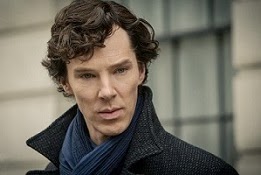 |
| Canonical Nods in "The Empty Hearse" |
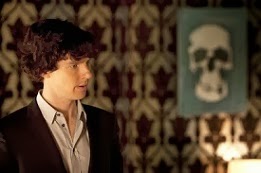 |
| Canonical Nods in "A Study in Pink" |


